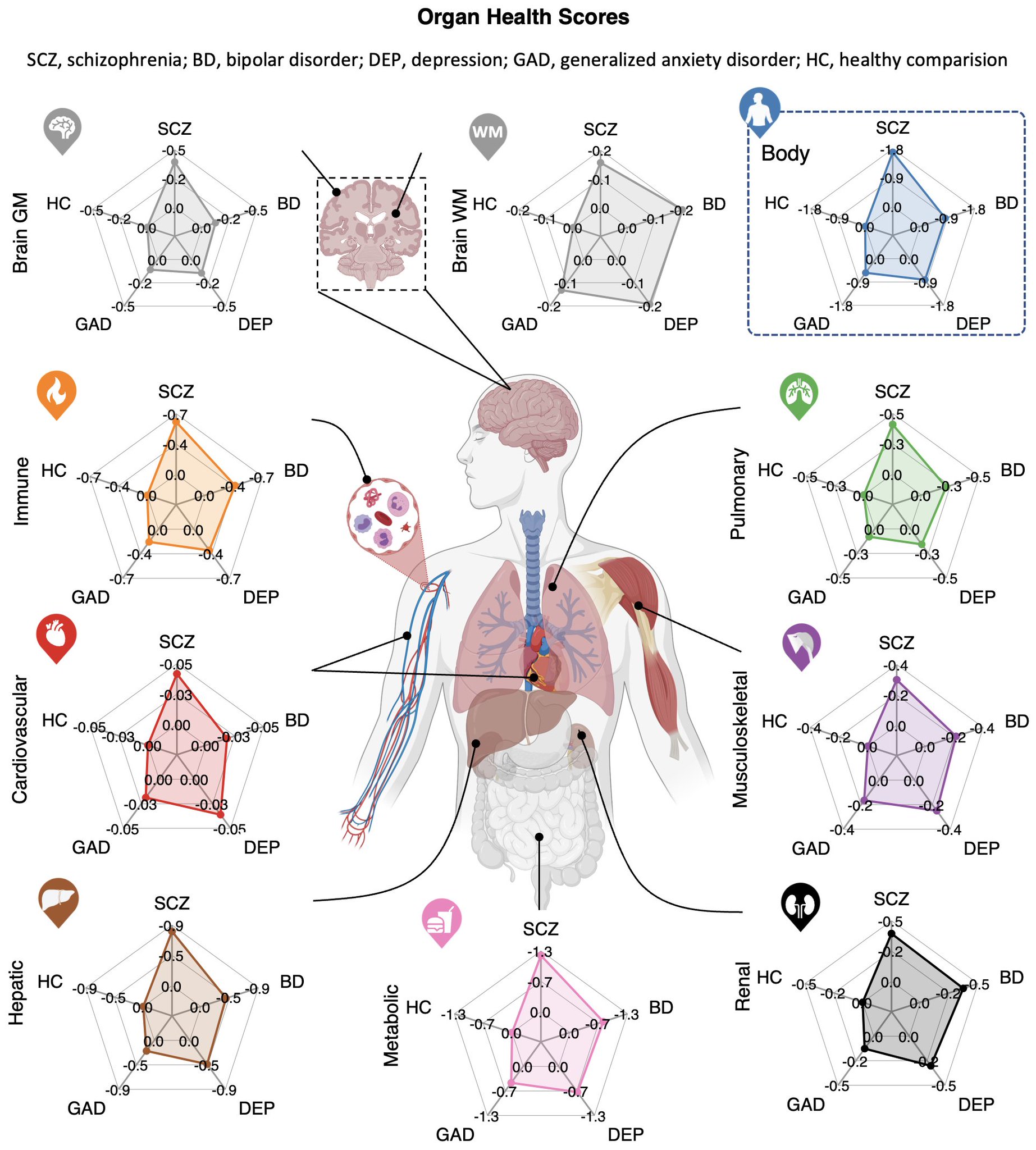rvallee
Senior Member (Voting Rights)
Evaluation of Brain-Body Health in Individuals With Common Neuropsychiatric Disorders
https://jamanetwork.com/journals/ja...ccessKey=1b2a2eb2-ffa6-4ec1-b702-fc9b8eb4c840
JAMA Psychiatry. Published online April 26, 2023. doi:10.1001/jamapsychiatry.2023.0791
Findings
This multicenter population-based cohort study including 85 748 adults with neuropsychiatric disorders and 87 420 healthy control individuals found that poor body health, particularly of the metabolic, hepatic, and immune systems, was a more marked manifestation of mental illness than brain changes. However, neuroimaging phenotypes enabled differentiation between distinct neuropsychiatric diagnoses.
Results
There were 85 748 participants with preselected neuropsychiatric disorders (36 324 male) and 87 420 healthy control individuals (40 560 male) included in this study. Body health, especially scores indexing metabolic, hepatic, and immune health, deviated from normative reference ranges for all 4 neuropsychiatric disorders studied. Poor body health was a more pronounced illness manifestation compared to brain changes in schizophrenia (AUC for body = 0.81 [95% CI, 0.79-0.82]; AUC for brain = 0.79 [95% CI, 0.79-0.79]), bipolar disorder (AUC for body = 0.67 [95% CI, 0.67-0.68]; AUC for brain = 0.58 [95% CI, 0.57-0.58]), depression (AUC for body = 0.67 [95% CI, 0.67-0.68]; AUC for brain = 0.58 [95% CI, 0.58-0.58]), and anxiety (AUC for body = 0.63 [95% CI, 0.63-0.63]; AUC for brain = 0.57 [95% CI, 0.57-0.58]). However, brain health enabled more accurate differentiation between distinct neuropsychiatric diagnoses than body health (schizophrenia-other: mean AUC for body = 0.70 [95% CI, 0.70-0.71] and mean AUC for brain = 0.79 [95% CI, 0.79-0.80]; bipolar disorder-other: mean AUC for body = 0.60 [95% CI, 0.59-0.60] and mean AUC for brain = 0.65 [95% CI, 0.65-0.65]; depression-other: mean AUC for body = 0.61 [95% CI, 0.60-0.63] and mean AUC for brain = 0.65 [95% CI, 0.65-0.66]; anxiety-other: mean AUC for body = 0.63 [95% CI, 0.62-0.63] and mean AUC for brain = 0.66 [95% CI, 0.65-0.66).
Conclusions and Relevance
In this cross-sectional study, neuropsychiatric disorders shared a substantial and largely overlapping imprint of poor body health. Routinely monitoring body health and integrated physical and mental health care may help reduce the adverse effect of physical comorbidity in people with mental illness.

https://jamanetwork.com/journals/ja...ccessKey=1b2a2eb2-ffa6-4ec1-b702-fc9b8eb4c840
JAMA Psychiatry. Published online April 26, 2023. doi:10.1001/jamapsychiatry.2023.0791
Findings
This multicenter population-based cohort study including 85 748 adults with neuropsychiatric disorders and 87 420 healthy control individuals found that poor body health, particularly of the metabolic, hepatic, and immune systems, was a more marked manifestation of mental illness than brain changes. However, neuroimaging phenotypes enabled differentiation between distinct neuropsychiatric diagnoses.
Results
There were 85 748 participants with preselected neuropsychiatric disorders (36 324 male) and 87 420 healthy control individuals (40 560 male) included in this study. Body health, especially scores indexing metabolic, hepatic, and immune health, deviated from normative reference ranges for all 4 neuropsychiatric disorders studied. Poor body health was a more pronounced illness manifestation compared to brain changes in schizophrenia (AUC for body = 0.81 [95% CI, 0.79-0.82]; AUC for brain = 0.79 [95% CI, 0.79-0.79]), bipolar disorder (AUC for body = 0.67 [95% CI, 0.67-0.68]; AUC for brain = 0.58 [95% CI, 0.57-0.58]), depression (AUC for body = 0.67 [95% CI, 0.67-0.68]; AUC for brain = 0.58 [95% CI, 0.58-0.58]), and anxiety (AUC for body = 0.63 [95% CI, 0.63-0.63]; AUC for brain = 0.57 [95% CI, 0.57-0.58]). However, brain health enabled more accurate differentiation between distinct neuropsychiatric diagnoses than body health (schizophrenia-other: mean AUC for body = 0.70 [95% CI, 0.70-0.71] and mean AUC for brain = 0.79 [95% CI, 0.79-0.80]; bipolar disorder-other: mean AUC for body = 0.60 [95% CI, 0.59-0.60] and mean AUC for brain = 0.65 [95% CI, 0.65-0.65]; depression-other: mean AUC for body = 0.61 [95% CI, 0.60-0.63] and mean AUC for brain = 0.65 [95% CI, 0.65-0.66]; anxiety-other: mean AUC for body = 0.63 [95% CI, 0.62-0.63] and mean AUC for brain = 0.66 [95% CI, 0.65-0.66).
Conclusions and Relevance
In this cross-sectional study, neuropsychiatric disorders shared a substantial and largely overlapping imprint of poor body health. Routinely monitoring body health and integrated physical and mental health care may help reduce the adverse effect of physical comorbidity in people with mental illness.

